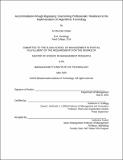| dc.contributor.advisor | Katherine C. Kellogg. | en_US |
| dc.contributor.author | Galper, Ari. | en_US |
| dc.contributor.other | Sloan School of Management. | en_US |
| dc.date.accessioned | 2020-09-03T16:45:31Z | |
| dc.date.available | 2020-09-03T16:45:31Z | |
| dc.date.copyright | 2020 | en_US |
| dc.date.issued | 2020 | en_US |
| dc.identifier.uri | https://hdl.handle.net/1721.1/126962 | |
| dc.description | Thesis: S.M. in Management Research, Massachusetts Institute of Technology, Sloan School of Management, May, 2020 | en_US |
| dc.description | Cataloged from the official PDF of thesis. | en_US |
| dc.description | Includes bibliographical references (pages 22-24). | en_US |
| dc.description.abstract | While algorithmic technologies are rapidly changing how work is performed in professional organizations, professional workers are resisting the implementation of these technologies in their workplaces. Previous studies of the development and implementation of workplace technologies suggest that managers or technology developers respond to workers' resistance in a way that is intended to make workers more amenable to using the technology, and that professionals' recalcitrance can ultimately impede the adoption of new technology despite managers' or developers' efforts. In my a 21-month field study of the development and implementation of three cases of machine learning-based algorithmic technology, I find that that the development and implementation of algorithmic technologies can proceed in the face of professionals' resistance when developers bypass the professional workers and repurpose the technology for use by another group of actors that is present in professional work settings: managers, administrators, and other "central" actors. Using the post-humanist concept of tuning -- which views technology development as a dialectic between resistance and accommodation -- I show that in order to carry out accommodation-through-bypassing, developers engage in a series of practices whereby they strategically manage relations with the resistant "local" actors, the technology itself, and the "central" actors. These findings highlight that the dialectic of resistance and accommodation that characterizes the technology development process can occur even in the face of strong professional recalcitrance, that accommodation can be strategically geared toward workers who are not the originally-intended users of a technology, and that technology developers can play a key role in influencing workplace relations in professional organizations. | en_US |
| dc.description.statementofresponsibility | by Ari Brendan Galper. | en_US |
| dc.format.extent | 24 pages | en_US |
| dc.language.iso | eng | en_US |
| dc.publisher | Massachusetts Institute of Technology | en_US |
| dc.rights | MIT theses may be protected by copyright. Please reuse MIT thesis content according to the MIT Libraries Permissions Policy, which is available through the URL provided. | en_US |
| dc.rights.uri | http://dspace.mit.edu/handle/1721.1/7582 | en_US |
| dc.subject | Sloan School of Management. | en_US |
| dc.title | Accommodation-through-Bypassing : overcoming professionals' resistance to the implementation of algorithmic technology | en_US |
| dc.type | Thesis | en_US |
| dc.description.degree | S.M. in Management Research | en_US |
| dc.contributor.department | Sloan School of Management | en_US |
| dc.identifier.oclc | 1191221543 | en_US |
| dc.description.collection | S.M.inManagementResearch Massachusetts Institute of Technology, Sloan School of Management | en_US |
| dspace.imported | 2020-09-03T16:45:31Z | en_US |
| mit.thesis.degree | Master | en_US |
| mit.thesis.department | Sloan | en_US |
